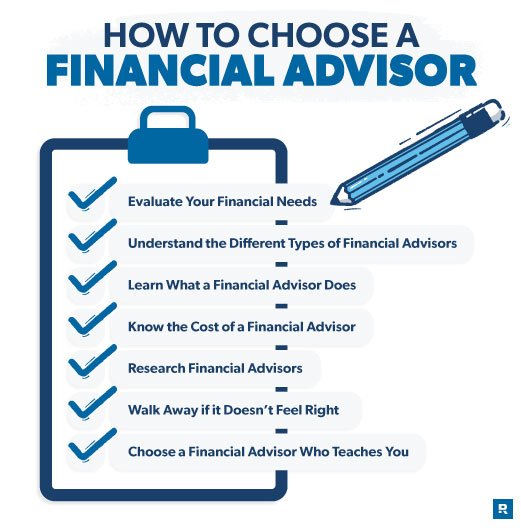
How to Find a Reputable Financial Advisor: Your Beginner’s Guide to Choosing Wisely
Navigating the world of personal finance can feel like a daunting task. From managing investments and planning for retirement to saving for a down payment or understanding complex tax implications, there are countless financial decisions to make. For many, the idea of doing it all alone is overwhelming, leading to the consideration of hiring a financial advisor.
But how do you find someone trustworthy? Someone who truly has your best interests at heart, not just their own commissions? This comprehensive guide will walk you through everything you need to know about finding a reputable financial advisor, even if you’re a complete beginner.
Why Consider a Financial Advisor?
Before diving into the "how," let’s understand the "why." A good financial advisor can be a valuable partner in your financial journey, offering:
- Expert Guidance: They possess specialized knowledge in areas like investment strategies, retirement planning, tax efficiency, estate planning, and more.
- Objective Advice: An unbiased advisor can help you make rational financial decisions, free from emotional biases that often cloud judgment (especially during market volatility).
- Time Savings: Managing your finances effectively takes time and effort. An advisor can free up your schedule by handling the heavy lifting.
- Accountability: They can help you stay on track with your financial goals, providing motivation and structure.
- Peace of Mind: Knowing your finances are in capable hands can significantly reduce stress and worry.
Who Needs a Financial Advisor?
You might think financial advisors are only for the super-rich, but that’s not true. While those with significant assets certainly benefit, a wide range of individuals can gain from professional guidance, including:
- Beginners: If you’re just starting your financial journey and feel lost.
- Busy Professionals: People who have good incomes but limited time to manage their money.
- Individuals Facing Major Life Changes: Getting married, having children, buying a home, changing jobs, inheriting money, or approaching retirement.
- Anyone with Specific Financial Goals: Saving for college, planning a big purchase, or starting a business.
- People Seeking Clarity: If you have multiple accounts, debts, and investments and need a cohesive strategy.
Understanding Different Types of Financial Advisors (Crucial for Reputability!)
This is perhaps the most critical section for ensuring you find a reputable advisor. Not all advisors operate under the same rules or have the same motivations.
Fiduciary vs. Suitability Standard: The Golden Rule
This is the single most important distinction to understand.
- Fiduciary Standard: An advisor who operates under a fiduciary standard is legally and ethically obligated to always act in their clients’ best interests, putting your needs above their own or their firm’s. This means they must disclose any potential conflicts of interest and recommend the most appropriate options, even if it means lower compensation for them.
- Suitability Standard: Advisors operating under a suitability standard (often brokers or registered representatives) are only required to recommend products that are "suitable" for your financial situation. This is a lower bar. A "suitable" product might not be the best product for you, and it could be one that pays the advisor a higher commission.
Key Takeaway: Always look for a financial advisor who adheres to the fiduciary standard. This is the hallmark of a truly reputable and client-centered advisor.
Understanding Advisor Compensation: How Do They Get Paid?
How an advisor gets paid directly impacts their potential conflicts of interest.
-
Fee-Only Advisors:
- How they’re paid: They are compensated only by the client directly, usually through an hourly rate, a flat fee for a specific plan, or a percentage of assets under management (AUM). They do not receive commissions from selling financial products.
- Why it’s good: This model minimizes conflicts of interest because their advice isn’t influenced by commissions. Their incentive is to help your money grow, as that often increases their AUM-based fee. They are almost always fiduciaries.
- Ideal for: Most individuals seeking unbiased advice.
-
Fee-Based Advisors:
- How they’re paid: This term can be confusing and misleading. "Fee-based" means they charge fees and can also earn commissions from selling products.
- Why it’s a concern: While they charge fees, the potential for commissions creates a conflict of interest. They might be incentivized to recommend products that pay them a commission, even if a non-commissioned alternative would be better for you. They may or may not be fiduciaries at all times.
- Caution: Always dig deeper if an advisor says they are "fee-based." Ask exactly how they are compensated for every service and product.
-
Commission-Based Advisors:
- How they’re paid: They earn money solely from commissions on the products they sell (e.g., mutual funds, annuities, insurance policies).
- Why it’s a concern: This model presents the highest potential for conflicts of interest. Their primary motivation might be to sell you a product that generates the highest commission, rather than the one that best suits your needs. They generally operate under the suitability standard, not the fiduciary standard.
- Avoid if: You are looking for truly unbiased financial advice.
Summary of Compensation & Fiduciary:
| Type of Advisor | How They Are Paid | Fiduciary Standard? | Potential Conflicts of Interest |
|---|---|---|---|
| Fee-Only | Client direct fee | Yes (always) | Very Low |
| Fee-Based | Client fee + Commissions | Sometimes (often only for advisory services, not product sales) | Moderate to High |
| Commission-Based | Commissions only | No (Suitability) | High |
For the most reputable and trustworthy advice, prioritize Fee-Only advisors who operate under the Fiduciary Standard.
Where to Begin Your Search for a Reputable Advisor
Once you understand the basics, it’s time to start looking.
1. Online Directories (Best Starting Point!)
Several reputable organizations maintain online directories of financial advisors, often with filters for fee structure and fiduciary status.
- National Association of Personal Financial Advisors (NAPFA): NAPFA is a leading professional association for Fee-Only financial advisors who are committed to the fiduciary standard. Their directory is an excellent place to start.
- XY Planning Network (XYPN): Specializes in Fee-Only financial advisors who work with Gen X and Gen Y clients, often on a monthly retainer model, making financial planning accessible.
- Garrett Planning Network: Another network of Fee-Only financial advisors who offer financial planning services on an hourly, as-needed basis, making it flexible and affordable for many.
- Certified Financial Planner Board of Standards (CFP Board): The CFP Board maintains a directory of CERTIFIED FINANCIAL PLANNER™ professionals. While not all CFPs are Fee-Only, they are held to a high ethical standard and must act as fiduciaries when providing financial planning advice. You can often filter for Fee-Only.
2. Referrals from Trustworthy Sources
Ask people you trust for recommendations, but always do your own due diligence.
- Friends and Family: Ask those who have financial advisors they are happy with.
- Other Professionals: Your accountant, estate attorney, or even a trusted real estate agent might have recommendations.
- Employer: Some employers offer access to financial wellness programs or have preferred advisors.
Important Note: A referral is a starting point, not an endorsement. Always verify the advisor’s credentials and fee structure yourself.
3. Professional Organizations
While directories are more direct, understanding the key certifications can help you identify qualified individuals.
- CERTIFIED FINANCIAL PLANNER™ (CFP®): This is one of the most respected designations. CFP® professionals have met rigorous education, examination, experience, and ethical requirements. They are trained in all aspects of financial planning, from investments to retirement and insurance. When providing financial planning advice, they are held to a fiduciary standard.
- Chartered Financial Analyst (CFA®): This designation is more focused on investment analysis and portfolio management. CFAs often work in institutional settings, but some work with individual clients.
- Personal Financial Specialist (PFS): A designation for CPAs who specialize in personal financial planning.
- Accredited Wealth Management Advisor℠ (AWMA®): Focuses on wealth management and planning for high-net-worth clients.
Look for advisors with a CFP® designation, as it signifies a broad understanding of financial planning and a commitment to ethical conduct.
Key Questions to Ask Prospective Advisors (The Interview Process)
Once you have a list of potential advisors, it’s time to interview them. Treat this like hiring someone for a crucial role in your life – because it is! Don’t be afraid to ask tough questions.
Here’s a list of essential questions, broken down by category:
Questions About Their Fiduciary Status & Compensation:
- "Are you a fiduciary? Will you commit to acting as a fiduciary in writing?"
- Why this matters: This is the most important question. Get it in writing!
- "How are you compensated? Are you Fee-Only, Fee-Based, or Commission-Based?"
- Why this matters: Reiterate your preference for Fee-Only to avoid conflicts of interest. If they say "fee-based," ask for a detailed breakdown of all potential fees and commissions.
- "What is your typical fee structure for someone with my financial situation/needs?"
- Why this matters: Understand the actual cost. Ask for a clear breakdown (e.g., percentage of AUM, hourly rate, flat project fee).
- "Are there any other hidden fees or costs I should be aware of?"
- Why this matters: Ensure full transparency.
Questions About Their Qualifications & Experience:
- "What are your professional designations or certifications (e.g., CFP®, CFA®)?"
- Why this matters: Look for a CFP® or similar reputable designations.
- "How long have you been a financial advisor?"
- Why this matters: Experience is valuable, especially through different market cycles.
- "What is your area of specialization or typical client base?"
- Why this matters: Some advisors specialize (e.g., pre-retirees, doctors, young families, small business owners). Find someone who understands your unique needs.
- "Can you provide references from current clients?"
- Why this matters: Speak to existing clients to get their perspective.
Questions About Their Services & Philosophy:
- "What specific services do you offer (e.g., investment management, retirement planning, tax planning, estate planning, insurance review)?"
- Why this matters: Ensure they cover the areas you need help with.
- "What is your investment philosophy or approach?"
- Why this matters: Understand how they manage money. Do they believe in active trading, passive indexing, value investing, etc.? Make sure it aligns with your comfort level.
- "How often will we meet or communicate, and in what format?"
- Why this matters: Set expectations for communication frequency and style.
- "Can I see a sample financial plan or client service agreement?"
- Why this matters: Get a concrete idea of what you’ll receive and what you’re signing up for.
Questions About Transparency & Accountability:
- "Do you have any disciplinary history or complaints filed against you or your firm?"
- Why this matters: This is a crucial question. Even if they say no, you’ll verify this independently (see next section).
- "Who is your custodian? Where will my assets be held?"
- Why this matters: Reputable advisors use independent custodians (like Schwab, Fidelity, Vanguard) to hold your assets, ensuring your money is separate from their firm. Avoid advisors who want to hold your money directly.
- "What happens if you are unavailable or retire?"
- Why this matters: Understand their succession plan for continuity of service.
Verifying Credentials and Background (Your Due Diligence)
Never take an advisor’s word alone. Always verify their claims using independent regulatory databases. This is where you uncover potential red flags.
1. FINRA BrokerCheck: For Brokers and Brokerage Firms
- What it is: FINRA (Financial Industry Regulatory Authority) is a self-regulatory organization that oversees brokerage firms and brokers. BrokerCheck allows you to research the professional backgrounds of brokers and brokerage firms.
- What you’ll find: Employment history, licenses held, and any customer complaints, arbitration cases, or disciplinary actions.
- How to use it: Go to BrokerCheck.finra.org and search by the individual’s name or the firm’s name.
2. SEC Investment Adviser Public Disclosure (IAPD): For Investment Advisors
- What it is: The SEC (Securities and Exchange Commission) and state regulators oversee registered investment advisors (RIAs). The IAPD website allows you to search for information about investment advisor firms and representatives.
- What you’ll find: Registration status, employment history, disciplinary actions, and Form ADV (a public document that RIAs must file with regulators, containing detailed information about their business, services, fees, and any disciplinary history).
- How to use it: Go to adviserinfo.sec.gov and search by the individual’s name or the firm’s name. Pay close attention to Part 2 of Form ADV, which outlines the advisor’s business practices, fees, and potential conflicts of interest.
3. State Insurance Departments: For Insurance Licenses
- If your advisor also sells insurance products (like life insurance or annuities), you can check their licensing status and any disciplinary actions through your state’s Department of Insurance website.
Look for:
- Clean Record: Ideally, you want an advisor with no disciplinary actions or significant complaints.
- Consistent Information: Ensure the information they provide matches what you find in these databases.
- Form ADV (Part 2): Read this document carefully. It’s a goldmine of information about the advisor’s business model, fees, and potential conflicts.
Red Flags to Watch Out For
While doing your research, be highly skeptical of any advisor who exhibits these behaviors:
- Guarantees High Returns: No legitimate financial professional can guarantee investment returns. Anyone who does is likely being dishonest or trying to sell you something risky.
- High-Pressure Sales Tactics: Reputable advisors focus on education and building long-term relationships, not high-pressure sales.
- Promises of "Secret" or "Exclusive" Investments: If it sounds too good to be true, it almost certainly is. Legitimate investments are generally transparent and regulated.
- Reluctance to Disclose Fees or Compensation: A reputable advisor will be completely transparent about how they get paid.
- Pushing Proprietary Products: Advisors working for a specific firm might be pressured to sell their firm’s own products, which may not be the best fit for you. Independent advisors have a wider array of options.
- Urging You to Move Money Quickly: Be wary if an advisor pressures you to transfer all your assets immediately without thorough discussion or a clear plan.
- No Fiduciary Commitment: If they won’t explicitly state they are a fiduciary and put it in writing, walk away.
- Disciplinary History: Any significant complaints or disciplinary actions on BrokerCheck or IAPD are major red flags.
- "Advisor" Without Credentials: Someone calling themselves a "financial advisor" without any recognized designations (like CFP®) or regulatory oversight.
Making Your Final Decision
After your interviews and thorough background checks, you should have a clear picture of your top choices.
- Trust Your Gut: Beyond the facts, how did you feel during the conversations? Did you feel comfortable, understood, and respected?
- Review Agreements Carefully: Read the financial planning agreement or client service agreement thoroughly before signing. Ensure you understand all fees, services, and responsibilities.
- Start Small (If Possible): If you’re still uncertain, consider starting with a limited engagement, like a one-time financial plan, before committing to a long-term relationship.
- Communicate Your Expectations: Be clear about your financial goals and what you expect from the advisor.
- Don’t Rush: This is an important decision. Take your time to compare options and make an informed choice.
Conclusion
Finding a reputable financial advisor is a journey that requires research, due diligence, and a clear understanding of what you need. By prioritizing Fee-Only advisors who adhere to the Fiduciary Standard, asking the right questions, and thoroughly verifying their credentials, you significantly increase your chances of finding a trustworthy professional who will truly act in your best financial interest.
Remember, your financial future is too important to leave to chance. Take the time to find the right partner who can guide you toward achieving your goals with confidence and peace of mind.




Post Comment